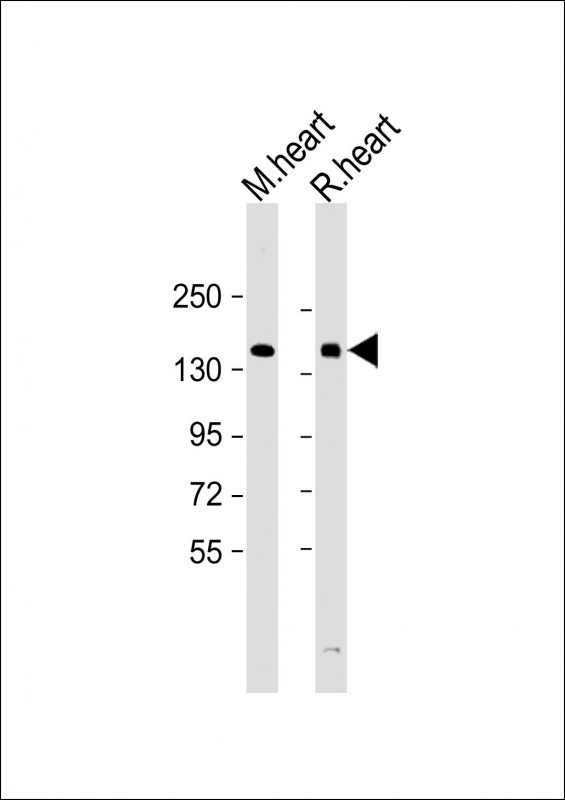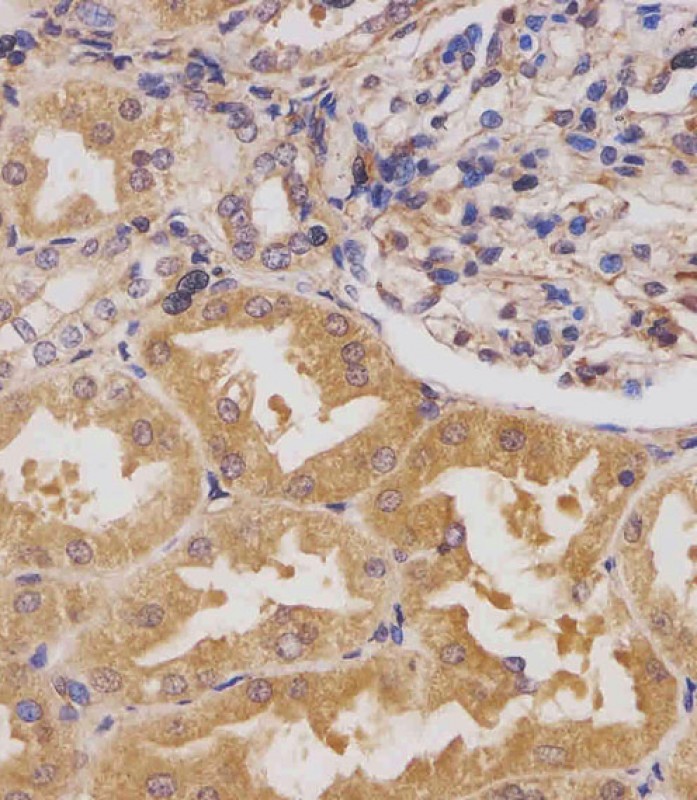

| WB | 1/2000 | Human,Mouse,Rat |
| IF | 咨询技术 | Human,Mouse,Rat |
| IHC | 1/100-1/500 | Human,Mouse,Rat |
| ICC | 技术咨询 | Human,Mouse,Rat |
| FCM | 咨询技术 | Human,Mouse,Rat |
| Elisa | 咨询技术 | Human,Mouse,Rat |
| Aliases | Homeodomain-interacting protein kinase 3, Androgen receptor-interacting nuclear protein kinase, ANPK, Fas-interacting serine/threonine-protein kinase, FIST, Homolog of protein kinase YAK1, HIPK3, DYRK6, FIST3, PKY |
| Entrez GeneID | 10114 |
| WB Predicted band size | 133.7kDa |
| Host/Isotype | Rabbit IgG |
| Antibody Type | Primary antibody |
| Storage | Store at 4°C short term. Aliquot and store at -20°C long term. Avoid freeze/thaw cycles. |
| Species Reactivity | Human, Mouse, Rat |
| Immunogen | This HIPK3 antibody is generated from rabbits immunized with a KLH conjugated synthetic peptide between 1127-1156 amino acids from the C-terminal region of human HIPK3. |
| Formulation | Purified antibody in PBS with 0.05% sodium azide,1%BSA and 50% glycerol.prepared by Saturated Ammonium Sulfate (SAS) . |
+ +
以下是关于HIPK3抗体的3篇参考文献及其摘要概括:
1. **文献名称**:*HIPK3 modulates p53 activity through Ser-46 phosphorylation in apoptosis and autophagy*
**作者**:Rinaldo C. et al.
**摘要**:研究揭示HIPK3通过磷酸化p53蛋白的Ser-46位点调控细胞凋亡和自噬,实验中采用特异性HIPK3抗体验证其在DNA损伤反应中的表达及定位。
2. **文献名称**:*Downregulation of HIPK3 in colorectal cancer correlates with tumor progression and predicts poor prognosis*
**作者**:Zhang Y. et al.
**摘要**:通过免疫组化及Western blot分析,发现结直肠癌组织中HIPK3表达显著下调,并与患者生存率相关,研究利用HIPK3抗体揭示其作为潜在抑癌基因的作用。
3. **文献名称**:*HIPK3 interacts with and destabilizes the transcription factor c-Myb*
**作者**:Kim EA. et al.
**摘要**:研究证实HIPK3通过泛素-蛋白酶体途径降解c-Myb,调控造血细胞分化,实验中通过HIPK3抗体验证两者相互作用及HIPK3的激酶活性依赖性。
4. **文献名称**:*HIPK3 suppression attenuates neurodegeneration in Drosophila models of Parkinson’s disease*
**作者**:Lee J. et al.
**摘要**:在帕金森病果蝇模型中,抑制HIPK3可减少多巴胺能神经元退化,研究通过抗体检测HIPK3在神经炎症中的表达变化,提示其作为治疗靶点的潜力。
以上文献均涉及HIPK3抗体在功能研究或疾病模型中的应用,涵盖癌症、神经退行性疾病及分子机制探索。
Homeodomain-interacting protein kinase 3 (HIPK3) is a serine/threonine kinase belonging to the HIPK family, which plays critical roles in transcriptional regulation, apoptosis, DNA damage response, and cellular signaling pathways. HIPK3 interacts with various transcription factors and co-regulators, modulating gene expression in response to stress or developmental cues. It is implicated in Wnt and TGF-β signaling, influencing cell proliferation, differentiation, and survival. Dysregulation of HIPK3 has been associated with cancer, neurodegenerative diseases, and fibrosis, highlighting its therapeutic and diagnostic potential.
HIPK3 antibodies are essential tools for studying its expression, localization, and function. These antibodies enable detection of endogenous HIPK3 in applications like Western blotting, immunoprecipitation, and immunofluorescence. Researchers utilize them to investigate HIPK3's role in disease models or signaling cascades. Commercially available HIPK3 antibodies are typically raised against specific epitopes (e.g., N-terminal or kinase domains) in hosts like rabbit or mouse, with formats including monoclonal or polyclonal variants. Validation often involves knockout cell lines or siRNA-mediated depletion to confirm specificity. Cross-reactivity with other HIPK family members (HIPK1/2/4) must be ruled out due to structural similarities. Recent studies using HIPK3 antibodies have uncovered its involvement in alternative splicing regulation and stress granule dynamics, expanding its known biological scope. Suppliers such as Abcam, Cell Signaling Technology, and Santa Cruz Biotechnology provide HIPK3-specific antibodies, though performance may vary across experimental conditions.
×